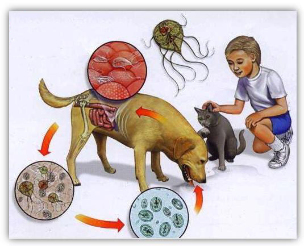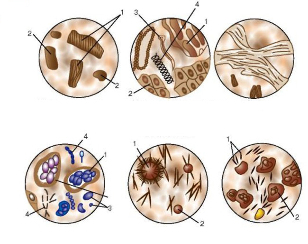Parasites are microorganisms that survive by eating their host organisms. Living in the human body, they cause serious health problems, and as a result of their reproduction, they can be fatal.
Parasitic organisms are generally classified into two types:
- Zooparasites, which include parasitic worms (helminths, flatworms), arachnids, lice, mollusks, etc.
- Phytoparasites are parasitic plants, viruses, pathogenic fungi, etc.
Also, some types of viruses, which lead to parasitic lifestyles at the expense of foreign organisms, can be classified as parasites.
Unfortunately, even modern society cannot protect itself from being infected with parasites, but if you do the analysis for the parasite in time, you can prevent its reproduction and get rid of it without endangering health.
Symptoms that indicate the presence of parasites in the human body
The penetration of parasites into the human body occurs through natural openings such as the mouth, genitals and anus. More rarely, helminths penetrate the skin, genitourinary system or ears.
The causative agent of the disease can be spread by food and water (most helminths), through body contact with infected people (cream worms), through soil, through air or dust (ringworm).
Often, invasive disease is not symptomatic, showing its presence to me at all. But with excessive reproduction, signs of various diseases appear, which usually do not indicate the presence of parasites, which significantly complicates treatment due to the inability to make an accurate diagnosis.
However, there are a number of signs by which one can assume that parasites are present in the human body.
Among them:
- frequent headaches;
- common joint pain;
- unreasonable muscle pain;
- frequent colds;
- allergic skin rash;
- difficult to defecate and constipation;
- grind teeth during sleep;
- low efficiency, constant fatigue;
- nervousness increases;
- insomnia;
- cracked heels;
- shortness of breath;
- digestive tract disorders;
- significant weight fluctuations;
- fragility of nail plate;
- itching in the anus.
Neoplasm tumor
Keep in mind that parasitic diseases can cause serious problems. For example, a large number of helminths can coalesce and cause intestinal obstruction.
Parasites can also cause chronic cell damage, cancer, anemia, or jaundice.
Parasitic signs in children

Symptoms to identify the presence of parasitic organisms in children:
- regular dietary violations (poor appetite, greed);
- rising body temperature;
- allergic rash;
- depressed, weak, nervous;
- dark circles under the eyes;
- pale skin;
- intestinal problems (diarrhea with mucus or constipation);
- nausea and vomiting especially in the morning.
A large number of parasites cannot leave the human body alone. Therefore, if at least one of the above symptoms appears, it is important to contact a local therapist or pediatrician, undergo parasitic testing and undergo worm treatment.
Diagnostics of invasive diseases
The diagnosis of invasive disease involves the detection of parasites (cream worms, amuba) and their reproductive products (larvae, eggs). Blood tests, stools, tissue scraps or sputum tests have been prescribed. To study the sample, do:
- histological examination;
- immunological studies;
- blood macroscopy;
- vegetative resonance test.
Testing the presence of parasites in children

Before visiting a specialist, parents often ask what tests need to be done to identify parasites in the child and which methods will give more accurate results. Analysis for invasive diseases in children is determined based on the location and type of parasite.
Most frequently set:
- blood test by ELISA;
- serological tests;
- scrape or smear with PCR method;
- blood tests in adults and children.
Blood tests are the most effective type of research and allow you to determine the true picture of the disease, the type of helminth, as well as the ability to reproduce. It allows you to determine the presence of ascariasis, toxoplasma, cysticercosis, amoebas and lichen.
This type of study is an ELISA blood test, which allows you to assess the content of specific antibodies in plasma, makes it possible to determine the degree of infection, to study the body's immune response to the effects of helminths and allows you to identify specific elements in the blood.
Advantages of ELISA research:
- the accuracy of the results, regardless of the qualifications and experience of the laboratory assistant;
- high analytical sensitivity, up to 90% accuracy;
- allows you to show a complete picture of the disease and the number of parasites;
- parasites are diagnosed in the early stages of development;
- ability to monitor disease dynamics;
- determination of the presence of toxic products in the blood.
When interpreting the results, the color of the reagent and the shadow intensity of the sample are taken into account. The ratio of antibodies to parasitic antigens is measured by the level of IgM and IgG markers in the blood. High concentrations of IgM and IgG were maintained throughout the period of helminths presence.
If the blood test shows high IgM levels, then the disease is acute. IgG antibodies talk about a chronic form of the disease.
Lack of blood tests for the diagnosis of parasitic diseases:
- Blood test results by ELISA were obtained within 7 days, while scraping, smear and stool samples were obtained after 1-2 days;
- research must be conducted in a special laboratory for a fee.
It is best to donate blood on an empty stomach, especially in the first half of the day, it is recommended not to take the medicine 12-15 hours before taking blood. Parents are advised to prepare their child in advance.
Stool Analysis

Microscopic analysis of feces may be required for the initial determination of helminths in the traditional way. During the study, the presence of parasitic eggs in fecal debris was determined.
The most accurate result is the result shown in 3 tests for a week.
For the most accurate results, feces debris must be sent for examination to the laboratory no later than 45 minutes after defecation.
During the study, parasites such as:
- tapeworm;
- topic;
- round helminths.
This type of diagnostic, relatively simple, is not 100% accurate. This is due to the fact that parasites that live in the human body may not lay eggs for a long time.



























